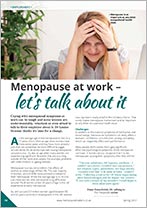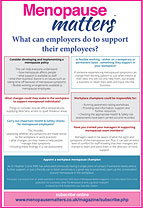Menopause at Work
Menopause in the workplace – let’s talk about it
Coping with menopausal symptoms at work can be tough and some women are, understandably, reluctant or even afraid to talk to their employer about it.
With around 3.5 million women aged between 15 and 65 years currently in employment in the UK, women now represent nearly a half of the UK labour force. That surely makes menopause mainstream and as important as any other occupational health issue.
Working through the menopause
- Many women find they are little prepared for the onset of the menopause and are even less equipped to manage its symptoms at work. They tend not to disclose their symptoms to their manager
- The majority of women feel they need further advice and support
- Workplaces and working practices are not designed with menopausal women in mind
- Heavy and painful periods, hot flushes, mood swings, fatigue and poor concentration can pose significant and embarrassing problems for some women, resulting in lowered confidence
- Women are often uncomfortable disclosing their symptoms and problems to managers, particularly if they are young or male.
- Where women have to take time off work to deal with their symptoms many do not disclose the real reasons for their absence
- Some women say they have to work extremely hard to overcome their perceived shortcomings due to their menopause
- Others consider working part-time, despite the concern about the impact on their career. Some even think about leaving employment altogether.
Source: UNISON’s Health and Safety guide to the menopause
Wouldn’t it be great to see employers providing...
- Greater awareness among managers of the menopause as a real occupational health issue
- Provision of a culture where women feel comfortable about discussing their symptoms and what impact that has on their working lives
- Options around flexible working hours and working arrangements to help manage symptoms
- Improved access to support –formal or informal
- Options to improve your work environment temperature and ventilation
You might find it helpful to...
- Find out more about menopause in general
- Talk to your GP about treatment choices
- Talk with a manager / HR department you feel comfortable with
- Use technology where it can help you – setting up reminders on your phone or taking more notes
- If you have supportive work colleagues talk about your experiences with them, you may find you’re not alone. Humour can help deflect embarrassment and increase your confidence
- Look into mindfulness techniques you can practice at work and home
- Consider lifestyle changes – could you exercise more? Stop smoking or set a revised weight goal?
This article is an extract from an article published in the Spring 2017 issue of Menopause Matters magazine.
» Download the article as a PDF (314Kb)"Menopause at work"
» Download an A4 Poster here. PDF (300Kb)
» Subscribe or buy the latest issue of Menopause Matters magazine here.
Menopause in the Workplace - Links
» The little book of menstruation, menstrual health and menopause (pdf)
» Menstruation, menstrual health and menopause in the workplace – Guide (pdf)
» UK Parliament, House of Commons Committee report (28 July 2022)
» Womens Health Concern: Menopause in the workplace (19 Oct 2021
» Response to the BMA report 'Challenging the culture on menopause for doctors'. (14 Aug 2020)
» Challenging the culture on menopause for doctors (Aug 2020)
» The menopause nearly killed me (6 June 2021)
» New menopause and the workplace guidance and model workplace policy (Oct 2019)
» Why companies should be supporting employees going through the menopause (18 Oct 2019)
» Menopausal women 'should get flexible work hours' - BBC News (21 Sep 2019)
» Union leader calls for bosses to act on menopause
» Financial sector takes part in survey about impact of menopause
» MPs to examine lack of support for working menopausal women
» We need to stop the menopause hijacking careers
» Northern Ireland MPs and journalists call for stigma to end


